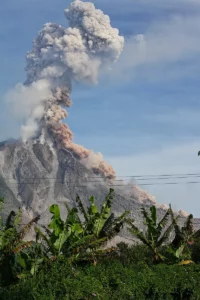Welcome to our look at volcanic eruptions and their profound impact on the environment and society. As a leading authority in the field of geology and natural phenomena, we aim to provide you with an in-depth understanding of the positive and negative effects associated with volcanic eruptions. By exploring the intricate dynamics of these powerful events, we shed light on their implications for various aspects of life on Earth.
Understanding Volcanic Eruptions
Volcanic eruptions, majestic displays of nature’s raw power, occur when molten rock, volcanic ash, and gases are discharged from a volcano’s vent. These eruptions can vary in intensity, duration, and geographical impact, making each event unique and unpredictable. Let us delve into the positive and negative consequences of volcanic eruptions, shedding light on their lasting influence.
Positive Effects
1. Fertility of Soil
One of the most remarkable positive impacts of volcanic eruptions lies in the enrichment of soil fertility. Volcanic ash, composed of finely powdered rock and minerals, is carried by wind and deposited over large areas. This ash is rich in essential nutrients like phosphorus, potassium, and magnesium, which greatly enhance soil productivity. Consequently, volcanic regions often harbor lush vegetation and support thriving agricultural practices.
2. Geothermal Energy
Volcanic activity facilitates the harnessing of geothermal energy, an abundant and renewable resource. Geothermal power plants tap into the Earth’s internal heat, using steam and hot water produced by volcanic processes to generate electricity. This sustainable energy source contributes to reducing reliance on fossil fuels, mitigating environmental pollution, and fostering a greener future.
3. Creation of New Landforms
Volcanic eruptions shape the Earth’s surface by creating unique landforms that can be of significant geological and ecological interest. Volcanic islands, such as Hawaii and Iceland, emerge from the oceanic depths due to volcanic activity. These new landforms provide habitats for diverse species, foster biodiversity, and offer unparalleled opportunities for scientific research and exploration.

Volcanic Eruptions
Negative Effects
1. Environmental Disruption
Volcanic eruptions can have profound negative impacts on the environment. The release of large quantities of volcanic gases, including sulfur dioxide and carbon dioxide, can lead to air pollution and contribute to the greenhouse effect, potentially leading to climate change. Volcanic ash can also disrupt air traffic, pose health hazards to humans and animals, and contaminate water bodies, affecting aquatic ecosystems.
2. Destruction of Infrastructure
The sheer force and destructive power of volcanic eruptions can wreak havoc on human settlements and infrastructure. Lava flows, pyroclastic flows, and volcanic mudslides, known as lahars, can engulf towns and villages, destroying buildings, roads, and agricultural fields. The economic and social repercussions of such destruction can be devastating for affected communities.
3. Threat to Human Health
Volcanic eruptions pose direct threats to human health, primarily through the release of hazardous gases and volcanic ash. Fine particles of ash can irritate the respiratory system, causing respiratory problems, eye irritation, and skin issues. In addition, exposure to toxic gases emitted during eruptions, such as hydrogen sulfide and hydrochloric acid, can have severe health consequences.
Conclusion
Volcanic eruptions are complex geological events that shape our planet in both positive and negative ways. By examining the impacts of volcanic eruptions on soil fertility, geothermal energy, landform creation, environmental disruption, infrastructure destruction, and human health, we gain a holistic understanding of their far-reaching effects. As we strive for a balanced appreciation of nature’s grandeur, it is crucial to comprehend and address the challenges posed by volcanic activity, mitigating negative consequences while harnessing the positive potential it offers.









